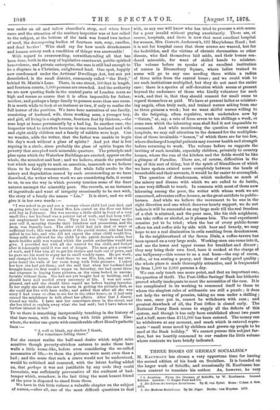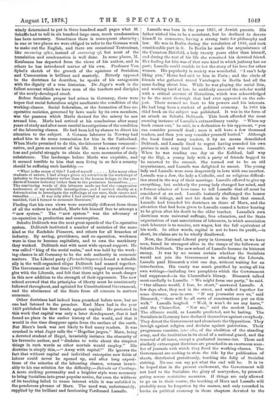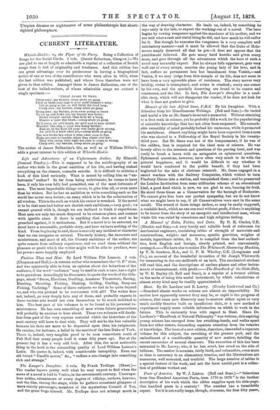THREE BOOKS ON GERMAN SOCIALISM.* M. KAUFMANN has chosen a
very opportune time for issuing the second edition of his book on Socialism. It is founded on the larger work of Schaffie, and occasionally M. Kaufmann has been content to translate his author. As, however, he very
• 1. Socialism. From the German of Saddle, by W. Kaufmann. Second Edition. London : C. Kegan Paul and Co. 2. Die Lehren des heuagen Socialism:4. By H. von SybeL Bonn : Cohen & Son. 1872.
S. Der Moderne Socialismus. By Dr. Jager. Berlin : von Iluyden. 1873.
wisely determined to put in three hundred small pages what M. Schliffie had to tell in six hundred large ones, much condensation has been necessary. Sometimes there is consequent obscurity ;
in one or two places we were obliged to refer to the German work to make out the English, and there are occasional Teutonisms, like savouring after, instead of savouring of, but most of the translation and condensation is well done. In some places, M. Kaufmann has departed from the views of his author, and in
others he has introduced matter of his own. Professor Von Sybel's sketch of the growth of the opinions of Socialism
and Communism is brilliant and masterly. Bitterly opposed to the doctrines he describes, he speaks of his antagonists with the dignity of a true historian. Dr. Jager's work is the fullest account which we have seen of the teachers and disciples
of the newly-developed creed.
Before Socialism proper had arisen in Germany, there were
hopes that social federalism might ameliorate the condition of the working-classes. Social federalism, or the formation of free co- operative societies, governed by laws made by its own members, was the panacea which Mario devised for the misery he saw around him. Mario had arrived at his conclusions after many years of study and after most careful investigations of the condition of the labouring classes. He had been led by chance to direct his attention to the subject. A German labourer in Norway had asked him to do some commission for him in the Fatherland.
When Mario promised to do this, the labourer became communi- cative, and gave an account of his life. It was a story of cease- less and painful struggle to obtain the mere necessaries of daily subsistence. The landscape before Mario was exquisite, and it seemed terrible to him that men living in so fair a country should be suffering sueh hardship :—
"What is the cause of this ? I asked myself Like many other
students of nature, I had always given my attention in the workshops of industry to the machinery rather than to the human beings, to the pro-
ducts of human industry rather than to the producers themselves The convincing words of this labourer made me feel the comparative uselessness of my scientific investigations, and I arrived shortly at a determination to investigate the sufferings of our race, their causes and remedies It was only after I had arrived at my own conclusions, unaided, that I turned to economic literature."
Finding that his own views were essentially different from those of all the writers he studied, Mario felt himself free to attempt a '" new system." The "new system" was the advocacy of co-operation in production and consumption.
Schultz Delitzsch was the next great apostle of the Co-operative system. Delitzsch instituted a number of societies of the same kind as the Rochdale Pioneers, and others for all branches of industry. By saving, providence, and co-operation, workmen were in time to become capitalists, and to own the machinery they worked. Delitzsch met with most wide-spread support. He
was called" king of the social realm," and was held by the work- ing-classes in all Germany to be the sole authority in economic matters. The Liberal party (Fortschrittspartei) found a valuable
ally in the well-organised clique Delitzsch had massed together. The Government at that time (1860-1863) waged repeated strug- gles with the Liberals, and felt that there might be much danger in this new addition to the strength of their opponents. The new school avowed that the principles of liberty must be consistently followed throughout, and agitated for Constitutional Government, and the abstinence of the State from all concern in matters economic.
Other doctrines had indeed been preached before now, but no one had listened to the preacher. Karl Marx had in the year 1859 published his first tirade against capital. He protested in this work that capital was only a later development, that it had found no place in the earlier history of the world, and that it would in due time disappear again from the surface of the earth. But Marx's book was not likely to find many readers. It was couched in what Jager calls the "Hegelian jargon." Marx, being a devoted student of Hegel, invariably imitates the obscurity of his favourite author, and "disdains to write about the simplest things in such words as other mortals would employ." His doctrine is simply this,—" Away with capital !" He ignores the fact that without capital and individual enterprise new fields of labour could never be opened up, and after long exposi- tions of the miseries of the labouring classes, returns invari- ably to his one solution for the difficulty,—Deleada est Carthago. A more striking personality and a brighter style were necessary to bring Socialism into great popular notice, for even the wildness of its teaching failed to rouse interest while it was unfolded in the ponderous phrases of Marx. The need was, unfortunately, supplied by the brilliant and fascinating Ferdinand Lassalle. Lassalle was born in the year 1825, of Jewish parents. His father wished him to be a merchant, but he declined to devote himself to commerce, having a strong taste for philosophy and law. He was in Berlin during the revolution of 1848, and took considerable part in it. In Berlin he made the acquaintance of the Countess Hatzfeld, a lady twenty years older than himself, and during the rest of his life she remained his devoted friend. Her feeling for him was of that rare kind in which jealousy has no part ; Lassalle could confide to her the story of his love for other women. his popularity in society was wonderful. "I can't help liking you," Heine had said to him in Paris ; and the circle of friends who gathered round Varnhagen in Berlin had all the same feeling about him. While he was playing the social lion, and working hard at law, he suddeuly amazed the scholar world with a critical account of Heraclitus, which was acknowledged to be the most thorough that had ever appeared on the sub- ject. There seemed no limit to his powers and his interests. He had long been a student of political economy. In 1864 his chief book on the subject was published. It was in the form of an attack on Schultz Delitzsch. This book afforded the most amusing instance of Lassalle's extraordinary vanity. "When my book comes out," he said, in a dedication to his opponent, "you can consider yourself dead ; soon it will have a few thousand readers, and then you may consider yourself buried." Although the book found many readers, it by no means demolished Delitzsch, and Lassalle lived to regret having sounded his own praises in such very loud tones. Lassalle's end was romantic. When he was reading one day at the Kaltbad, half way up the Rigi, a young lady with a party of friends begged to be escorted to the summit. She turned out to be an old acquaintance, and Lassalle was delighted to assent. The young lady and Lassalle were soon desperately in love with one another. Lassalle was a Jew, the lady a Catholic, and so religious difficul- ties stood in the way of their marriage. Lassalle offered to give up everything, but suddenly the young lady changed her mind, and a former admirer of hers came to tell Lassalle that all must be considered at an end. Lassalle instantly challenged the bearer of the ill tidings, and met his death in the duel that ensued. Lassalle had founded his doctrines on those of Marx, and the attention that had been given to Lassalle caused a better hearing to be given after his death to the older teacher. Lassalle's own doctrines were universal suffrage, free education, and the State organisation of vast associations of labourers, in which association each labourer is to receive, not wages, but the full equivalent of his work. In other words, capital is not to have its profit,—in short, its claims are to be wholly disallowed.
Now, the National-Liberal party in Germany had, as we have seen, found its strongest allies in the camps of the followers of Schultz Delitzsch. The new school of Lassalle became its bitterest enemy. It was by no means certain whether the Socialists would not join the Government in attacking the Liberals. Lassalle paid Bismarck a visit one day, without waiting for an introduction. His vanity was much gratified by seeing all his own writings—including two pamphlets which the Government had suppressed—in the Chancellor's library. Bismarck talked most cordially to Lassalle. "We might form one party," he said. "Our alliance would, I fear, be short," answered Lassalle. A few days after, they met in the street, and walked together for some distance, arm-in-arm. "If any journalist sees us," said Bismarck, "there will be all sorts of constructions put on this walk." Lassalle laughed. "Well, it won't do me any harm," said the Chancellor. "Nor me," said the modest Lassalle. The alliance could, as Lassalle predicted, not be lasting. The Socialists in Germany have declared themselves against everybody.
They detest the Government and abominate the Opposition. They inveigh against religion and declaim against patriotism. Their
programme consists, inter alia, of the abolition of the standing
army, and the institution in its stead of a national guard, and the removal of all taxes, except a graduated income-tax. These and similarly extravagant doctrines are preached in an enormous num- ber of journals with which they flood the working-classes. The Government are seeking to stem the tide by the publication of sheets, distributed gratuitously, teaching the folly of Socialist striving. No one can say yet what the end will be. It is to be hoped that in the present excitement, the Government will not lend to the Socialists the glory of martyrdom, by promul-
gating severe restrictive measures. If things are only allowed to go on in their course, the teaching of Marx and Lassalle will probably soon be forgotten by the masses, and only recorded in l! books on political economy in those chapters devoted to the
Utopian dreams or nightmares of some philanthropic but short- sighted philosophers.
































 Previous page
Previous page